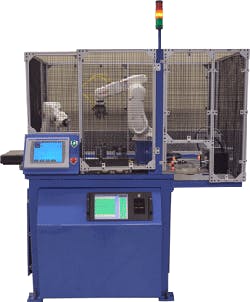Automatic Self-Calibration for Robotic Eddy-Current Testing
“This product will revolutionize the way products are quality tested in the automotive industry,” promised Mark Gehlen, president & CEO of United Western Technologies Corp. (UniWest).
UniWest custom-designs eddy-current and ultrasonic testing products for automotive OEM’s inspection tasks. Applications in aerospace, power generation, and other industries are developed, too. In a partnership with Salem Design and Manufacturing LLC, Uni-West developed the Uni-Versal™ test machine, which it called “the first flexible test platform that offers totally robotic testing of metal bearings and spindles using eddy-current testing (ECT) for cracks.”
The developer also indicated the Uni-Versal is the first machine of its type capable of true automatic self-calibration. Based on Salem Design and Manufacturing’s automotive industry experience, the Uni-Versal test machine was designed to meet the current need for automated, reliable product quality verification of metal bearings and spindles. It reportedly accelerates the verification process with no interruption of flow, and reduces the potential for operator error or misreading of results because auto-calibration ensures consistently accurate readings.
The core of the design is UniWest’s US-525M multi-channel eddy-current testing instrument. Built for durability and offering up to eight channels, the ECT unit has a frequency range of 20 Hz to 10 Mz; a high signal-to-noise ratio; a bright, 12-in. diagonal color LCD flat-panel screen; and 32 Gig of data storage. It offers input/output (I/O) capability, USB and Ethernet connectivity, and three discrete alarm gates with independent outputs per channel.
The Uni-Versal has a compact footprint (37 in. deep × 44 in. long) and can be installed inline or alongside a conveyor belt. It can be programmed to handle and test a variety of spindles and bearings.
In operation, a technician selects a part number and a three-dimensional image of the part appears on the screen; the Uni-Versal automatically resets the gain for that part. One robotic arm then lifts the part from the conveyer and brings it into the test machine where it is placed on a rotating chuck. Another robotic arm manipulates the eddy-current probe, while ensuring that it remains precisely the same distance from the part’s surface to ensure accuracy. Separate probes robotically test inside and outside diameters for flaws.
The Uni-Versal test machine segregates rejected parts from verified parts. An optional impact marker can then mark the accepted parts. Verified parts are returned to the line with no disruption to product flow. Rejected parts are placed on a separate conveyor. Parts are divided into zones to identify flaw locations.
“UniWest has a long history of innovation in non-destructive testing,” Gehlen stated, adding that the two development partners share “a deep understanding of the automotive industry and the challenges it faces today.”
About the Author
Robert Brooks
Content Director
Robert Brooks has been a business-to-business reporter, writer, editor, and columnist for more than 20 years, specializing in the primary metal and basic manufacturing industries.
